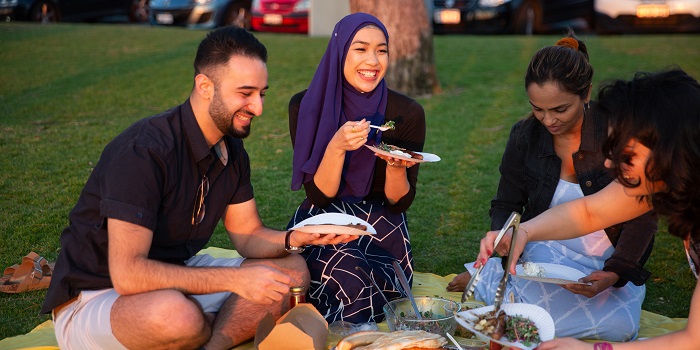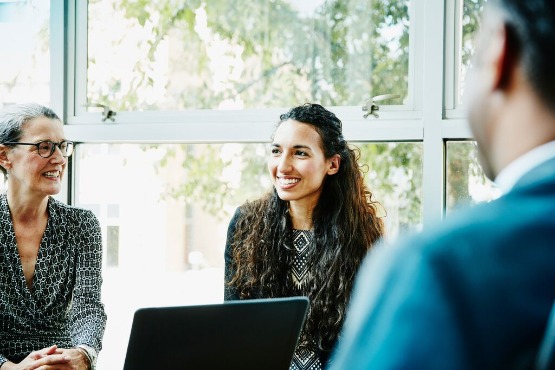Feel
Easing back into social situations
Lockdown restrictions have lifted, and for many, there’s a general feeling of relief, excitement and joy. But it may also feel uncomfortable and odd socialising again. Perhaps you’d been looking forward to heading out for a meal or to the shops, but now you aren’t so sure. Here, I share how to ease back into social situations if you’re feeling anxious.

A version of normality is returning; friends and family are reuniting, and all businesses are opening their doors once more. It’s the moment many of us have been waiting for for a long time. But, while it’s a positive turning point, it can also feel daunting – and that’s entirely normal.
After a long, dark winter in lockdown, the busyness of shops, pubs and other social spaces can be overwhelming. You may not feel as ready as you thought you would. But don’t be hard on yourself. These five tips will help you ease back into things – when you’re ready to.
Social anxiety is common
Many people will feel anxious stepping out after the time we've spent in lockdown. Even the most confident people can feel some degree of anxiety when they’re in social situations. Whether that be a new situation or something they haven’t done for a while.
The change in ‘social rules’ may also cause, or add to, social anxiety. Can we hug? How far apart should we be? When should I wear my mask? These are all new things to think about, which can cause anxious feelings.
You certainly won’t be the only person having these thoughts – find comfort knowing that you aren’t alone. Try talking to your family or friends about any worries you have. There’s a good chance they may feel the same.
Ease yourself back in
There’s no pressure to get out and socialise straight away, or that often. Start by meeting one or two friends at first, or just see your close family. Making lots of plans with different people might feel overwhelming.
You may also find socialising or hosting again tiring after a long period of being socially inactive. Take it slow and start with your nearest and dearest in smaller groups.
Pre-plan things within your control
There are lots of things you can’t control when you’re in a social environment. You don’t know what conversations you’ll have or what questions you’ll be asked. You don’t know how others will act or how busy the place you’re meeting at will be.
Focusing on the thing you can control may help you feel better.
- If you’re meeting people somewhere, plan how you’ll get there and how you’ll get home.
- Choose to meet somewhere you’re familiar with.
- If you’re eating out, look at the menu in advance and decide what to eat.
- Get ready in good time, so you don’t feel rushed.
Respect other people’s views
Everyone will feel differently about the easing of lockdown. If a close friend or family member isn’t ready to meet up in person, try to maintain contact on the phone or over screen. Or suggest a one-on-one walk and coffee, before meeting in a larger group.
Do what you can to help others feel comfortable. You may choose to not wear a face covering, but respect other people if they still wear one. And if you want to wear a face covering, then do so. Some places may ask you to wear a face covering, for example, in crowded spaces.
Be present and connect
Remind yourself of all the things you missed during lockdown. So many of those things are now possible. Whether that be having coffee with your best friends, hosting a BBQ in your garden or getting back to sport or other activities you’ve missed.
Social interaction and healthy relationships play a huge role in your overall wellbeing. Feeling close to, and valued by, others is an important human need.
Next time you’re in a social situation, bring yourself into the moment. Put your phone away, listen to whoever is talking and appreciate all the things you’ve missed about being with them.
If you’re worried about your mental health, our direct access service aims to provide you with the advice, support and treatment you need as quickly as possible. You’ll be able to get mental health advice and support usually without the need for a GP referral. Learn more today.
-
Sources Sources
- Zheng L, Miao M, Lim J, et al. Is lockdown bad for social anxiety in COVID-19 regions? A national study in the SOR perspective. Int J Environ Res Public Health 2020; 17(12): 4561. doi: 10.3390/ijerph17124561
- From lockdown to relaxation of covid rules: tips on looking after your mental health. Mental health Foundation. www.mentalhealth.org.uk, last reviewed March 2021
- Guidance. Coronavirus: how to stay safe and help prevent the spread from 19 July. GOV UK. www.gov.uk, last revised 12 July 2021
About our health information
At Bupa we produce a wealth of free health information for you and your family. This is because we believe that trustworthy information is essential in helping you make better decisions about your health and wellbeing.
Our information has been awarded the PIF TICK for trustworthy health information. It also follows the principles of the The Information Standard.

More feel articles...
Did you find our advice helpful?
We’d love to hear what you think. Our short survey takes just a few minutes to complete and helps us to keep improving our healthy lifestyle articles.
Legal disclaimer
This information was published by Bupa's Health Content Team and is based on reputable sources of medical evidence. It has been reviewed by appropriate medical or clinical professionals and deemed accurate on the date of review. Photos are only for illustrative purposes and do not reflect every presentation of a condition.
Any information about a treatment or procedure is generic, and does not necessarily describe that treatment or procedure as delivered by Bupa or its associated providers.
The information contained on this page and in any third party websites referred to on this page is not intended nor implied to be a substitute for professional medical advice nor is it intended to be for medical diagnosis or treatment. Third party websites are not owned or controlled by Bupa and any individual may be able to access and post messages on them. Bupa is not responsible for the content or availability of these third party websites. We do not accept advertising on this page.





